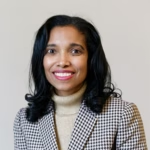
In a current cultural climate fraught with racial tension and division, BIC pastor Tracie Hunter shares her insights and experience reaching across the divide to bring her community closer together.
Having ministered for nearly 20 years in Cincinnati, Ohio, operating a Christian radio station, organizing hundreds of community prayer walks, and finally joining the Western Hills BIC as senior pastor in July 2009, I have dealt with racial issues on many levels.
Raised Catholic, I was accustomed to attending schools and worshiping in churches where I was the racial minority.
I strived to fit in among European Americans but didn’t always feel accepted or valued in those settings. The reality is that many of us live and worship among people who look like us and with whom we culturally share a lot in common. As an adult, I began worshiping in churches where I could grow spiritually and, for the first time in my life, cultivate my African-American heritage.
It is my experience that true conciliation only results when we are intentional, strategic, and consistent in our efforts to build bridges which enable us to move beyond our racial divide.
But joining the BIC brought me back to my roots in a sense, once again worshipping in a denomination where I was the racial minority. I don’t view this as a negative, but rather as a spiritually positive opportunity. In the BIC, being an African-American senior pastor comes with great challenges and responsibility. I desire to help pave the way for other African-Americans from both within and without the BIC who desire to mutually embrace and appreciate the differences that make us one in Christ. I believe it is with the same intentionality with which God made us black, brown, and white that we must not superficially tolerate, but genuinely celebrate, appreciate, and embrace our differences.
When we talk about race, admittedly, I am not a fan of the term “racial reconciliation.”
The word “reconciliation,” in its literal definition, means coming back together or being friendly again after a disagreement. The problem is that we can’t reconcile something that has never been together. In the United States, many in the black community still suffer the effects of a long, dark history of racism and segregation. Perhaps this explains why reconciliation between the races seems difficult; what if we’re starting at a place that never existed?
So I would like to address racial conciliation as ground zero.
Racial conciliation requires initiating relationships and intentionally building bridges with others that foster genuine community. This can take many forms. For instance, in 2001, during the aftermath of riots following the shooting of an unarmed black man, I organized and led the largest multiracial prayer walk in Cincinnati’s history. This walk was documented to have squelched a violent uprising between police and citizens.
I’ve also reached out to our predominantly Caucasian neighborhood civic association and community council, offering to help address growing violence and crime in our community. I have now served on the organizing and planning committee with another member from Western Hills BIC for almost a year. Meeting regularly at our church, we work with residents, city leaders, business owners, and police to end violence in our community, making it safer for all residents of every hue.
We also host outside movie nights during the summer in our churchyard. This has attracted white and Hispanic members of our community, which has encouraged fellowship among individuals who might not normally come together. When people play together, they are more likely to worship together. Additionally, I participate in a multiracial, interdenominational ministerial alliance.
It is my experience that true conciliation only results when we are intentional, strategic, and consistent in our efforts to build bridges that enable us to move beyond our racial divide. With Christ as our example and leader, let us come together to solve these problems and work to remove the fear that often divides us.
Adapted from “Bridge Builders: BIC pastors crossing racial divides” for BIC U.S.’ August 2016 Connect newsletter.



